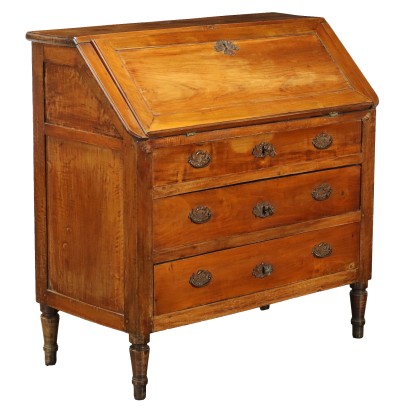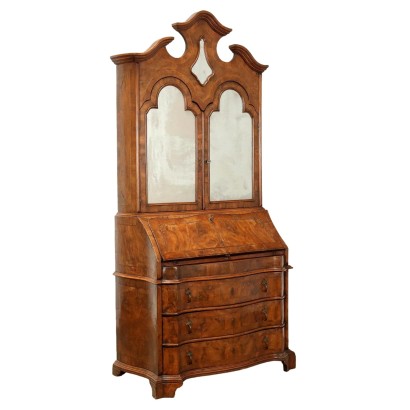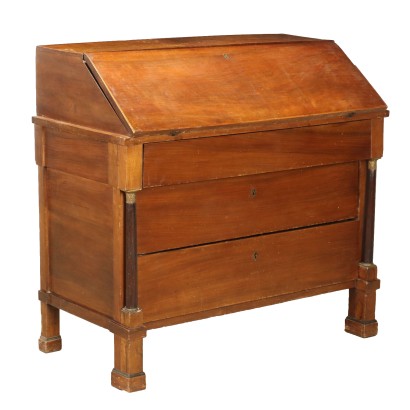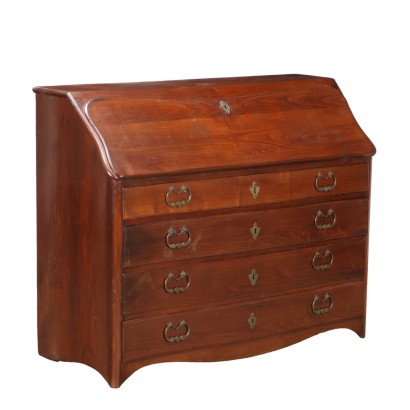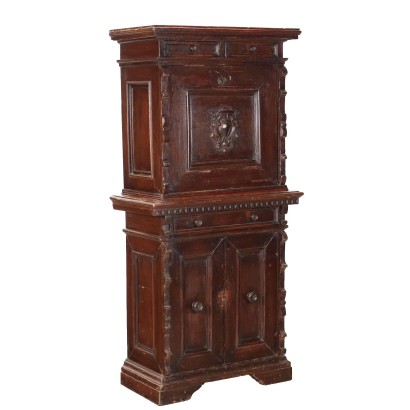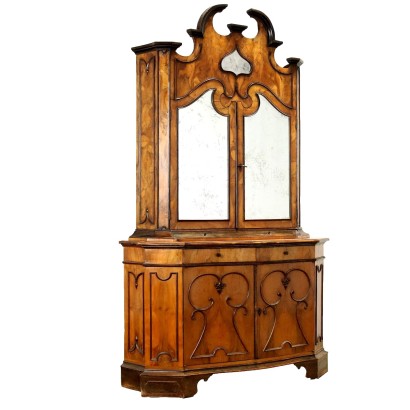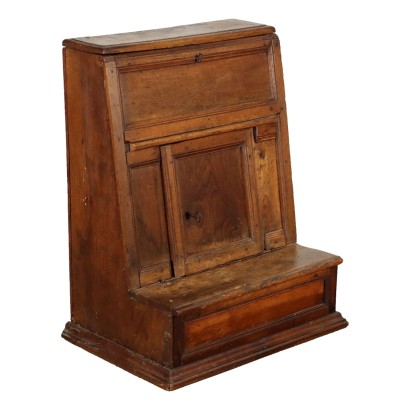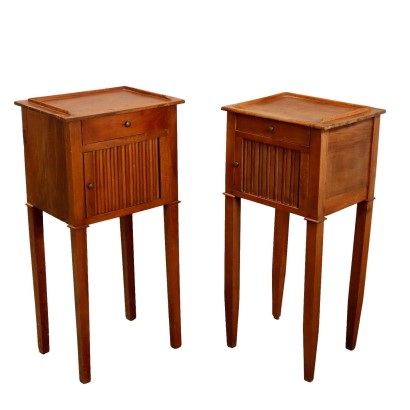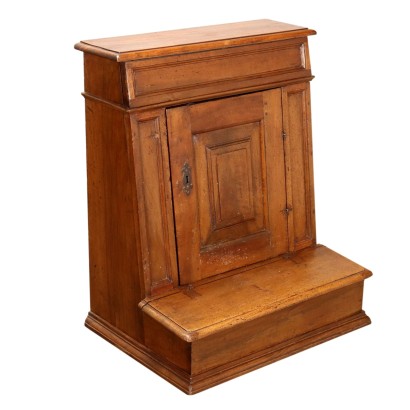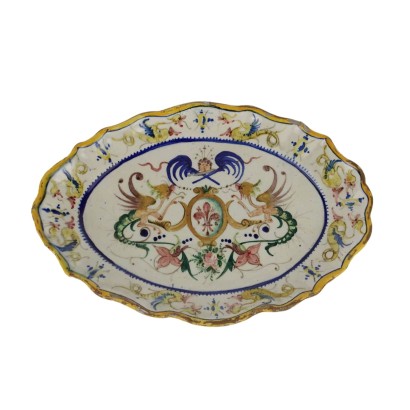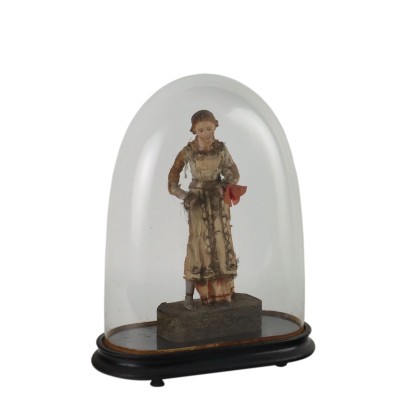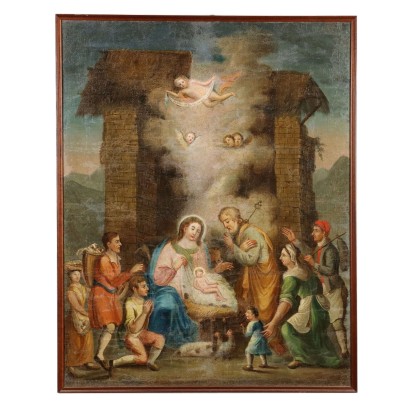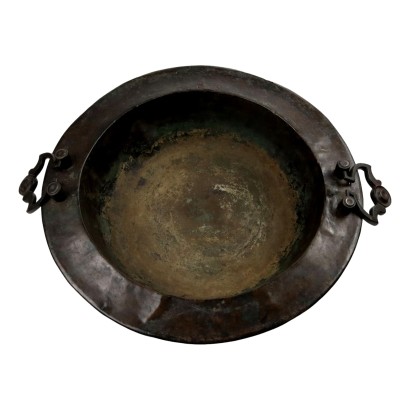Small Ancient Flap Cabinet Piedmont Early XIX Century Walnut Poplar - Piedmont, XIX Century
Features
Piedmont, XIX Century
Age: 19th Century / 1801 - 1900
Origin: Piemonte, Italy
Material: Shear plate
Description
Piedmontese flap supported by turned truncated cone feet, on the front it has three drawers surmounted by a flap opening door concealing a cabinet with a central compartment and 5 small drawers. In walnut, the interiors are in poplar, vents and sockets in sheet metal.
Product Condition:
Product which due to age and wear requires restoration and re-polishing. We try to present the real state of the furniture as completely as possible with photos. If some details are not clear from the photos, what is stated in the description applies.
Dimensions (cm):
Height: 109,5
Width: 110
Depth: 54
Additional Information
Age: 19th Century / 1801 - 1900
19th Century / 1801 - 1900Main essence:
Walnut
Walnut wood comes from the plant whose botanical name is juglans regia , probably originally from the East but very common in Europe. Light or dark brown in color, it is a hard wood with a beautiful grain, widely used in antique furniture. It was the main essence in Italy throughout the Renaissance and later had a good diffusion in Europe, especially in England, until the advent of mahogany. It was used for solid wood furniture and sometimes carvings and inlays, its only big limitation is that it suffers a lot from woodworm. In France it was widely used more than anything else in the provinces. In the second half of the eighteenth century its use decreased significantly because mahogany and other exotic woods were preferred.Poplar
Essence considered "poor", it is a white wood, with yellowish or greyish shades, light and tender, which is easily damaged. It is used for rustic furniture or in the construction of furniture. The most valuable use it has had in the history of furniture is in Germany, in the 19th century, for veneers and inlays in the Biedermeier period.Material: Shear plate
Other customers have searched:
Ribalte, trumeau, bureau, ribalta con alzata, cassettiera con ribalta, scrittoio, secretaire, stipo..
Dai un'occhiata anche ai nostri approfondimenti sul blog e alle presentazioni dei prodotti FineArt:
Leggi di più
Un cassettone a ribalta, espressione del gusto veronese di pieno Settecento
Secrétaire, il mobile con i nascondigli
Scrittoio a dorso d'asino, Piacenza, metà XVIII secolo
Cassettone a ribalta, Roma, secondo quarto XVIII secolo
Ribalta a urna, Milano metà XVIII secolo
Secrétaire, Bottega Francesco Maggiolini, primo quarto XIX secolo
Secrétaire, “Bottega dei fondi verdi”, inizi XIX secolo
Trumeau con anta a ribalta, Queen Anne, Inghilterra 1705 ca.
Sull'antiquariato in generale dai un'occhiata anche a:
Classic Monday: da un pezzo dei nostri magazzini alla storia dell'antiquariato
L'antiquariato dalla A alla Z: il Dizionario dell'Antiquariato
Il dizionario dell'antiquariato - Lastronatura
Il dizionario dell'antiquariato - Mascherone
Il dizionario dell'antiquariato - Natura morta
Il dizionario dell'antiquariato - Opificio
Il dizionario dell'antiquariato - Pastiglia
Il dizionario dell'antiquariato - Savonarola
Il dizionario dell'antiquariato - Rosone
Intaglio barocco con motivo a ricciolo
Leggi di più
Un cassettone a ribalta, espressione del gusto veronese di pieno SettecentoSecrétaire, il mobile con i nascondigli
Scrittoio a dorso d'asino, Piacenza, metà XVIII secolo
Cassettone a ribalta, Roma, secondo quarto XVIII secolo
Ribalta a urna, Milano metà XVIII secolo
Secrétaire, Bottega Francesco Maggiolini, primo quarto XIX secolo
Secrétaire, “Bottega dei fondi verdi”, inizi XIX secolo
Trumeau con anta a ribalta, Queen Anne, Inghilterra 1705 ca.
Sull'antiquariato in generale dai un'occhiata anche a:
Classic Monday: da un pezzo dei nostri magazzini alla storia dell'antiquariato
L'antiquariato dalla A alla Z: il Dizionario dell'Antiquariato
Il dizionario dell'antiquariato - Lastronatura
Il dizionario dell'antiquariato - Mascherone
Il dizionario dell'antiquariato - Natura morta
Il dizionario dell'antiquariato - Opificio
Il dizionario dell'antiquariato - Pastiglia
Il dizionario dell'antiquariato - Savonarola
Il dizionario dell'antiquariato - Rosone
Intaglio barocco con motivo a ricciolo

